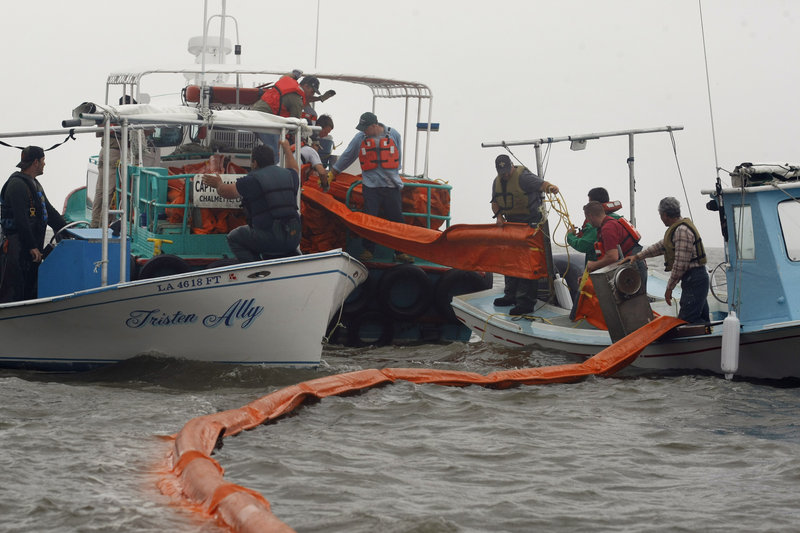NEW ORLEANS — The administrator of a $20 billion fund to compensate Gulf oil spill victims pledged Monday to speed payment of claims as a federal judge considered whether to lift a six-month moratorium on new deepwater drilling.
Kenneth Feinberg, who has been tapped by the White House to run the fund, said many people are in desperate financial straits and need immediate relief.
“We want to get these claims out quicker,” he said. “We want to get these claims out with more transparency.”
Feinberg, who ran the claim fund set up for victims of the Sept. 11, 2001, terrorist attacks, said BP has paid out over $100 million so far. Various estimates place total claims so far in excess of $600 million.
BP: CLEANUP TAB $2 BILLION SO FAR
BP said it has spent $2 billion fighting the spill for the last two months and compensating victims, with no end in sight. It’s likely to be at least August before crews finish two relief wells that are the best chance of stopping the flow of oil.
The British oil giant released its latest tally of response costs, including $105 million paid out so far to 32,000 claimants. That figure does not include the $20 billion fund BP PLC last week agreed to set up for residents and businesses hurt by the spill.
Also Monday, the government sent BP a $51.4 million bill for the response effort. BP has already paid two other bills totaling $70.9 million.
Shares of BP, which have lost about half their value since the April 20 oil rig disaster that killed 11 workers, fell nearly 3 percent Monday in New York trading to $30.86. The rig was owned by Transocean Ltd. but run by BP.
President Obama’s administration has been struggling to show it is responding forcefully to the spill, which has gushed anywhere from 68 million to 126 millions gallons of oil into the Gulf.
As part of that effort, the Interior Department halted the approval of any new permits for deepwater drilling and suspended drilling at 33 existing exploratory wells in the Gulf.
But a lawsuit filed by Hornbeck Offshore Services of Covington, La., claims the government arbitrarily imposed the moratorium without any proof that the operations posed a threat. Hornbeck says the moratorium could cost Louisiana thousands of jobs and millions of dollars in lost wages.
After hearing two hours of arguments Monday in New Orleans federal court, Judge Martin Feldman said he will decide by Wednesday whether to overturn the moratorium.
Plaintiffs’ attorney Carl Rosenblum said the six-month suspension of drilling work could prove more economically devastating than the spill itself.
“This is an unprecedented industrywide shutdown. Never before has the government done this,” he told the judge Monday.
RIG’S BLOWOUT ‘A GAME-CHANGER’
Government lawyers said that the Interior Department has demonstrated that industry regulators need more time to study the risks of deepwater drilling and identify ways to make it safer.
“The safeguards and regulations in place on April 20 did not create a sufficient margin of safety,” said Justice Department attorney Guillermo Montero.
Feldman asked a government lawyer why the Interior Department decided to suspend deepwater drilling after the rig explosion when it didn’t bar oil tankers from Alaskan waters after the Exxon Valdez spill in 1989 or take similar actions in the wake of other industrial accidents.
“The Deepwater Horizon blowout was a game-changer,” Montero said. “It really illustrates the risks that are inherent in deepwater drilling.”
Feldman asked Rosenblum if it’s true that a recent Securities and Exchange Commission filing by Hornbeck suggests that “basically things are pretty good” for the company and it can survive the moratorium. Rosenblum said the full impact of the shutdown cannot be calculated.
“Thousands of businesses will be affected,” he said. “These dominoes are falling as we speak.”
Louisiana Gov. Bobby Jindal’s office filed a brief supporting the plaintiffs’ suit. A lawyer for the state told Feldman that the federal government did not consult Louisiana officials before imposing the moratorium, in violation of federal law.
Catherine Wannamaker, a lawyer for several environmental groups that support the moratorium, said six months is a reasonable time for drilling to be suspended while the government studies the risks and regulations governing the industry.
“The risks here are new,” she said.
Send questions/comments to the editors.



Success. Please wait for the page to reload. If the page does not reload within 5 seconds, please refresh the page.
Enter your email and password to access comments.
Hi, to comment on stories you must . This profile is in addition to your subscription and website login.
Already have a commenting profile? .
Invalid username/password.
Please check your email to confirm and complete your registration.
Only subscribers are eligible to post comments. Please subscribe or login first for digital access. Here’s why.
Use the form below to reset your password. When you've submitted your account email, we will send an email with a reset code.